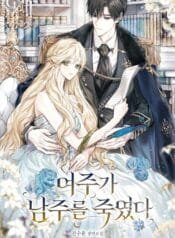As spring deepened, the temperatures inside and outside the residence gradually rose, which was a great relief for the growing fawn.
By now, Betty and Helen had come to accept the strange occurrences around Amelia without much resistance, attributing them to “His Highness the Crown Prince.” The fawn was no exception to this explanation.
Perhaps they secretly found the situation puzzling but chose not to show it. After all, no one within the palace dared openly oppose the Crown Prince’s decisions. Josef’s autonomy was always met with deference in this way.
“It doesn’t eat well when I try to feed it,” Betty remarked curtly as she sat on a low stool at the fawn’s eye level, holding a bowl of milk.
“Is that so?”
Amelia stood awkwardly beside her, uncertain of what to do. Just as Betty said, the fawn showed little interest, even when she brought the spoon right up to its mouth.
Of the three women living in the Crown Princess’s residence, none had experience raising animals. However, Betty, having assisted in the births of her two younger siblings and changed five children’s diapers, was deemed most suited to the task of feeding the fawn.
But the little creature was being inexplicably stubborn.
“Why do you think that is?”
As Amelia moved closer to observe, the fawn began nudging her hand with its nose.
“It seems to like you, Lady Amelia,” Betty said, her tone tinged with annoyance. Her attitude reflected the practical mindset of someone from Olstein, who saw the fawn as livestock to be raised rather than a cute pet.
Amelia, aware of how much Betty already did for her—especially considering she couldn’t even prepare a cup of tea herself—felt a twinge of guilt.
“Should I try feeding it?” Amelia offered.
Betty looked surprised and quickly shook her head.
“You shouldn’t be doing such menial tasks, my lady.”
“It’s fine. You’re busy, Betty, and you can’t spend all day tied up here.”
After repeated insistence, Betty reluctantly handed the bowl of milk to Amelia. What happened next was unexpected. Before Amelia even picked up the spoon, the fawn eagerly buried its nose into the bowl.
“W-wait a moment!”
Startled, Amelia tried to hold the fawn back, but her efforts only made things worse. Half the milk Betty had carefully warmed ended up splattered across the fawn’s face, Amelia’s dress, and the kitchen floor.
“Oh…”
“Looks like your dress will need to be washed,” Betty muttered, looking exasperated.
After wrestling with the fawn, Betty and Amelia discovered a few things: despite its small size, it was surprisingly energetic; it refused to eat unless Amelia fed it; and Amelia now needed to wear an apron whenever feeding it to avoid further mishaps.
Realizing that any mess the fawn made inside the residence would ultimately fall on Betty to clean up, Amelia decided to let it roam the garden during the day. The fawn quickly adapted to the small grove. Worried that the guards might mistake it for a wild animal and shoot it with an arrow, Amelia tied one of her handkerchiefs around its neck.
—
“It takes up to three years to build a single warship, but in Brienne, they claim they can complete one in just a year,” Henrik reported to Josef, relaying information he had gathered from the coastal margrave.
Brienne’s shipbuilding skills rivaled those of many kingdoms. It was estimated that they could produce about ten ships within a year.
“If we supply timber from Olstein, they said you could obtain warships without a significant budget,” Henrik continued.
Josef considered whether he’d heard anything about Olstein exporting timber to Brienne recently. Unsurprisingly, he had not.
“I checked to see if the imperial family had started supplying timber to Brienne, but there was no record of it,” Henrik added, just a beat behind Josef’s thoughts.
“…”
Reclining on the sofa, Josef mulled over the situation.
Henrik’s inquiries at the margrave’s territory suggested they hadn’t heard rumors of the imperial navy being built in Olstein. Nor did they know about Brienne constructing ships.
Brienne’s silence on the matter was commendable. However, it raised the question of where Brienne, unable to source such large quantities of timber independently, was obtaining its supplies if not from Olstein.
What kind of wood was needed for shipbuilding? Certainly not the planks used for houses. It would have to be massive, sturdy trees grown over many years—so large they’d be difficult to transport by carriage, likely requiring shipment by sea.
Josef mentally mapped the areas near the continent. The only place with accessible sea routes to Brienne and independence from the empire was the Kingdom of Kut.
“They might be sourcing timber from Kut,” Josef speculated aloud.
Henrik’s expression shifted.
“The Kingdom of Kut?”
“…”
“Could Brienne have discussed naval matters with Kut?”
“It’s not impossible.”
Though Josef’s tone remained calm and low, Henrik’s face grew increasingly pale.
“Your Highness, if that’s the case, Brienne has leaked imperial military secrets,” Henrik said urgently.
“…”
“Sanctions must be imposed immediately.”
Sanctions. Josef briefly envisioned planting a pike bearing the head of Leonid in front of Brienne’s fortress. It would be an easy solution, but not one he favored.
If deception against the empire occurred in the territory under his governorship, his honor would be tarnished as well. And that was something even Leonid’s execution couldn’t rectify.
“Do I even possess any honor worth protecting?”
Even now, nobles regarded him with wary, fearful eyes, as though he alone embodied the empire’s cruelty.
The memory of Amelia’s hesitant voice came to mind: “…Do you mean for me to kill it?”
When their eyes met—filled with a mixture of fear and reproach—Josef had felt an inexplicable urge to justify himself. It wasn’t the first time Amelia, who seemed incapable of harming even a bird, had stirred such feelings in him. And that, more than anything, wounded his pride as the Crown Prince.
“…If this reaches the Imperial Court, it will inevitably become my weakness.”
Breaking the long silence, Josef finally spoke.
“They’ll say the governor couldn’t properly keep Brienne in check.”
“…”
“For now, no one must know.”
By “for now,” Josef meant until he could turn the situation to his advantage, and “no one” meant everyone except Henrik.
“Understood.”
Henrik immediately grasped the implications.
“Can you travel to Brienne?”
Reaching Brienne would take less than a week on horseback. Josef’s question wasn’t about logistics but whether Henrik could carry out his orders discreetly, avoiding all suspicion.
“Yes, Your Highness,” Henrik replied, bowing his head.
—
The fawn roamed the garden tirelessly. At times, it sat quietly, sniffing flowers or curling up on the grass. Other times, a butterfly or bird would send it leaping about like a rabbit. Worried that it might wander out of the estate if left unchecked, Amelia spent most of her days watching over the little creature.
Fortunately, the fawn stayed closer whenever Amelia was in sight, which gradually increased her time in the garden.
Today, the fawn’s attention was captivated by the fountain. It stood motionless, gazing at the water splashing into the basin. Meanwhile, Amelia noticed Helen walking toward her.
“Helen?”
“There you are, Lady Amelia.”
Amelia hurried over to her.
“You said you were going out. Why not stay out longer and enjoy yourself?”
“No, my lady. You tire easily when you’re older,” Helen replied with a wry smile, holding a small paper box in her hands.
“Did you find something you liked?”
“Yes, but….”
Helen hesitated, uncharacteristically unsure. Amelia realized she must have come to the garden for a reason.
“Is something the matter?”
“My lady,” Helen began, still hesitating.
“You’re aware of the upcoming auction, aren’t you?”
“Yes, I heard about it from Lady Dana during the hunting tournament.”
Dana, who had adapted quickly to social circles, had rattled off a list of events scheduled for the year. Though Amelia had forgotten some, she distinctly remembered the auction was approaching, featuring spoils of war Josef had brought back.
“They say a diamond from Kut will also be included in the auction.”
“…I see.”
Amelia nodded. Helen and Betty often went out to buy essentials for the estate. Though they sometimes visited the market, they were also permitted to use items from the royal stores.
As a result, they frequented supply warehouses and sewing rooms, forming connections with the lower-ranking stewards. It was likely through such conversations that Helen learned about the auction.
But why was she bringing this up now? Helen had emphasized “Kut’s diamond” with a weight that seemed deliberate. Though the phrase was new to Amelia, her curiosity grew.
The reason for Helen’s emphasis became clear with her next words.
“They say the one who submitted the ‘Kut diamond’ is named Vidal.”
“Vidal?”
Amelia froze, instinctively clutching her neckline. “Vidal” was engraved inside the pendant of her necklace—and it was her father’s family name.
“Yes, the Duke of Leonid’s house,” Helen confirmed. “It got me thinking….”
Helen furrowed her brow, trying to recall a distant memory.
“…When the Duke left Kut, he received a diamond as part of his inheritance.”
“But, Helen, the Vidals could have more diamonds. That doesn’t mean it’s the same one.”
Amelia thought Helen’s assumption was too far-fetched. Kut produced many diamonds, and the Vidal family still thrived there. Above all, her father would have no reason to submit their family’s treasure to an auction in Olstein.
But Helen remained firm.
“This diamond has everyone from stewards to servants talking. They say it’s nearly 30 carats.”
“You used to love exploring every nook and cranny of Brienne’s castle.”
Suddenly, Amelia recalled a vivid memory.
It was from the time she’d sneaked into her father’s study and gotten scolded. She’d found a necklace somewhere—was it a display case? A desk drawer?
That necklace, the one she now wore daily, wasn’t whole. The letters “Vidal” were perfectly engraved on one side of the pendant, but the other side had an empty, concave space.
A large diamond, nearly 30 carats, had once been set there.
“Think back to that time—it may help you.”
Why had it taken her so long to remember?
“A diamond of that size wouldn’t have existed in the Vidal family, except as a family heirloom,” Helen insisted.
“Then….”
Amelia snapped out of her reverie.
“Do you think my father submitted the diamond for the auction?”
“No.”
Helen shook her head firmly.
“I think it’s a forgery, my lady.”






